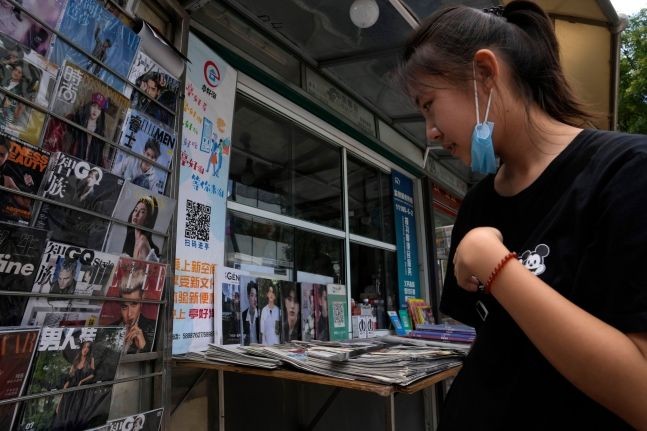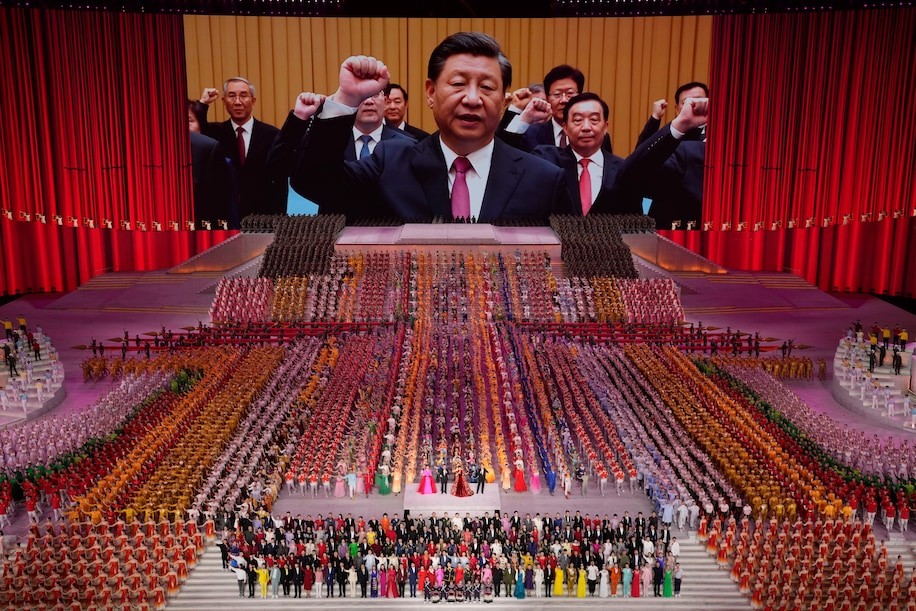A well-known Chinese social network service ‘Weibo’ suspended 21 fandom accounts of Korean celebrities such as BTS, IU, and Jang Won-young as of September 5. While doing so, Weibo also notified users that they are dealing with new regulations associated with the Chinese Central Cyberspace Affairs Commission’s policy on the ‘disordered fandom culture management’. Many news outlets interpreted their actions as the Chinese government’s new ‘Rectification Movement’, which is ‘the correction of policy directions by the Chinese Communist Party (CCP)’. Recently, there have been increasing amounts of regulation and intervention in the entertainment industry and otherwise, by the Chinese government.
 |
| ▲ A young woman looks at entertainment magazines in China. (Photo from AP News) |
The original Rectification Movement was led by Mao Zedong in 1942. Since then, there have been further large-scale Rectification Movements in 1948, 1950, and 1957. Most dealt with revamping the CCP. However, the movement has also been known to suppress Chinese artists and intellectuals, and excessively control their activities. In 2021, the Rectification Movement has returned. The National Radio and Television Administration (NRTA), a ministry-level executive agency that administers and supervises China’s media industry, announced a new restriction policy including several rigid guidelines. According to this plan, media platforms in China must assess their cast of celebrities for their political opinions, moral behavior, levels of sophistication, and social reputation. This is because the Chinese government thoroughly banned employing entertainers who do not advocate for the CCP. In addition, there are new rules regulating the appearance of celebrities and the mandatory study of ‘Xi Jinping’s new age socialism’. Celebrities being paid a salary deemed ‘too high’ are also prohibited from benefitting from double contracts and any forms of tax evasion. If any companies or entertainers do not uphold these policies, they risk being banned from TV or the internet. It would mean the end of their careers in China.
 |
| ▲ Chinese President Xi Jinping pledges his vows to the party during the 100th anniversary of the founding of the CCP ceremony. (Photo from AP News) |
The Chinese government also enacted other policies that will have a heavy influence on private education and video games as part of their Rectification Movement. As of August 6, the National Development and Reform Commission, which has control over China’s economy, announced that private education organizations must report their standardized tuition fees through each local government in China. They had also previously announced that all private education organizations were required to change to non-profit organizations and banned extra private education from taking place on weekends and holidays. As for online games, on August 30, China’s NRTA announced a policy to limit the number of hours youth spend on gaming. This is because, for a long period of time, the Chinese government has viewed online games as negative conduct. The policy states that people under the age of 18 can play computer games for up to 1 hour per day on Fridays, Saturdays, Sundays, and holidays from 8-9 p.m.
Many people find that these strict regulations are more excessive than necessary if their goal is to protect its citizens. There are two reasons for these invasive policies, to strengthen the influence of the CCP and to promote the goal of common prosperity. In doing so, they expect to minimize the spread of western culture and effectively inject the CCP’s propaganda into society. Using the power of celebrities to strengthen and advertise the CCP’s policy is one example of this cultural constraint. To promote Xi Jinping’s goal of ‘common prosperity’, the government is hoping to promote the illusion of income equality within its borders. The problem of income inequality is serious in China. According to a study by the London School of Economics in 2015, 10 percent of the population earned 41 percent of the country's income. News related to the wealth of CEOs and celebrities can force many people to be dissatisfied with the inequalities in the country. Xi Jinping hopes to remove symbols that can be used to unsettle the poor masses and win over the working class by regulating big industries and rich celebrities.
Strong regulation of the entertainment industry, games, and education are being implemented across China. These new rules will cause loss and damage both at home and abroad. With this in mind, it is necessary for Korean entertainment and gaming companies to prepare for the changes, and hopefully minimize the negative effects to survive this latest round of regulation changes in China.
김혜선, 김주예, 정소연 dankookherald@gmail.com

![[Campus Magnifier] Let's Surf the Library!](/news/photo/202404/12496_1765_4143.jpg) [Campus Magnifier] Let's Surf the Library!
[Campus Magnifier] Let's Surf the Library!
![[Campus Magnifier] Let's Surf the Library!](/news/thumbnail/202404/12496_1765_4143_v150.jpg)





